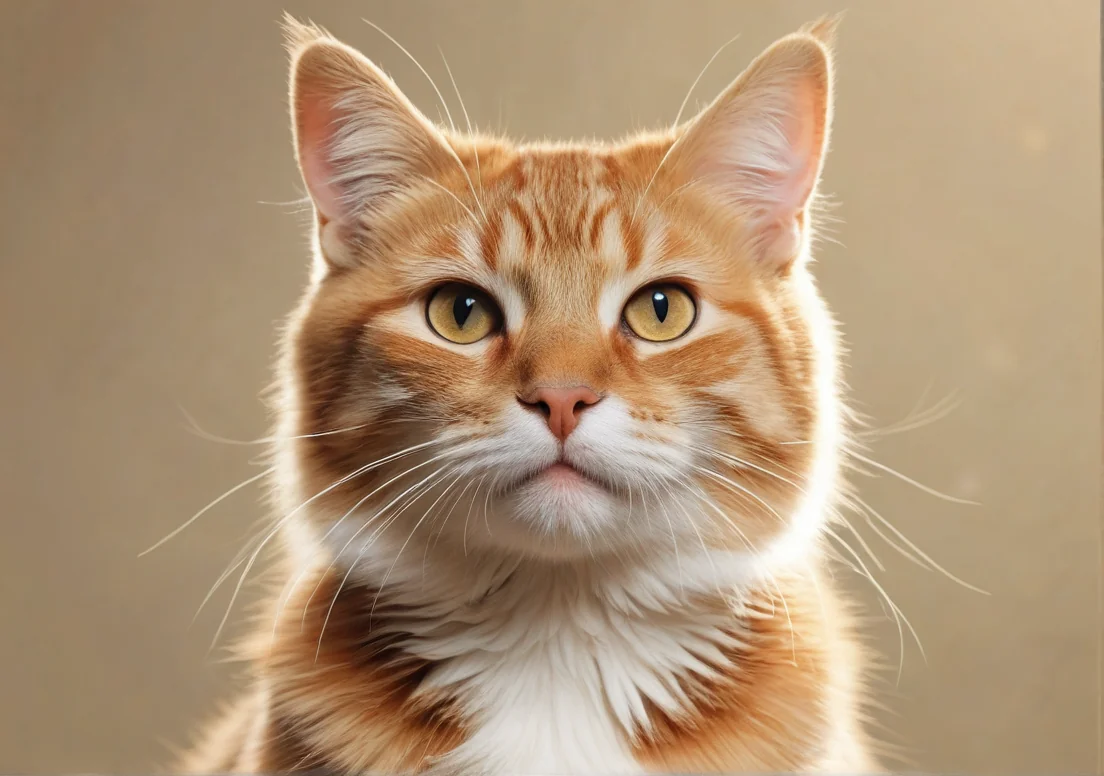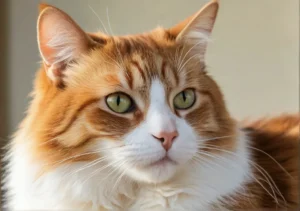When your cat trots out of the litter box and lets out a satisfied meow, it can spark a mix of curiosity and confusion. This little vocalization can leave you wondering what exactly is going on in that furry head of theirs.
Cats often meow after pooping as a way to communicate their feelings, whether it’s relief, ownership over the clean litter, or simply seeking attention. But that’s just the surface of this intriguing behavior, as there’s a lot more that could be influencing this peculiar post-poop chit-chat.

What does the meow actually mean?
A cat’s meow is their way of communicating, and it can express a range of emotions and needs. When they meow after pooping, it might indicate several things:
Attention-Seeking: Cats often vocalize to grab your attention. They might want to be praised for their bathroom business or just want some interaction after handling their business.
Contentment or Joy: The act of pooping can be a relief for your cat. Just like we might feel lighter after a good bathroom visit, your cat may be expressing happiness about finally feeling comfortable again.
Alerting You: Your kitty might be signaling that they need a litter box check or an immediate clean-up. Some cats are quite particular about a tidy bathroom space.
Each cat has their own personality, so a meow could blend one or several of these meanings, expressing individual quirks and moods.
Is it a sign of relief?
Absolutely! Cats can feel an immense sense of relief after they’ve done their business. Just think about it—after expelling waste, many animals, including us, experience a physical and emotional change.
For a cat, that relief can be quite vocal. The meow serves as a way for your furry friend to communicate their satisfaction or comfort. This post bathroom behavior might be tied to their instincts, reinforcing the feeling that their territory is now clean and safe.
It’s essential to remember that a cat’s comfort is closely linked to their litter box habits. If your cat’s meowing seems excessive or unusual after pooping, it can be worth observing other aspects of their health—like changes in appetite or bathroom habits. If these change, a trip to the vet might be on the agenda.
Understanding a cat’s behavior can be a window into their emotional state, and that joyful meow can signal everything is right in their little world following a successful trip to the litter box.
Could it be a way to mark territory?
Cats are natural territorial creatures. When your feline friend meows after pooping, it’s possible they’re making a statement about their space. This instinct, deeply ingrained from their wild ancestors, involves leaving scents behind from their waste. The meow can serve as an auditory announcement, signaling that they’ve claimed the area—much like a mini celebration of successfully defending their turf.
This behavior often isn’t just about the act of elimination; it can also relate to feeling secure and expressing confidence in their territory. If your cat’s meowl is particularly loud or insistent, it could indicate a desire to share their achievement. It’s their way of saying, “Look what I did!” and reinforcing their dominance over their chosen space.
Understanding this instinct can help you appreciate the layers of communication in your cat’s behavior. Cats speak in more than just meows; body language and actions also play significant roles. So next time your cat vocalizes after using the litter box, you can smile, knowing they are simply following their instinctual patterns of communication.
Is my cat trying to get my attention?
If your cat’s meows seem aimed at you post-poop, it could signal a social interaction needs. Cats are social animals, and some may want to engage their humans immediately after they’ve finished their business. In a sense, they’re saying, “Hey, I’m here! Acknowledge my accomplishment!”
This behavior might be especially evident if your cat has been particularly vocal or affectionate outside of their litter box routine. Cats have their own ways of seeking out attention, and a post-poop meow can be a simple request for interaction. They might want a little praise, a scratch behind the ears, or just your presence nearby.
Take a moment to observe the context:
- Vocal Tone: Is it a soft chirp, or a more demanding yowl?
- Body Language: Are they looking at you expectantly, or rubbing against your legs?
- Routine Behavior: Has there been a consistent pattern of them meowing after using the litter box?
Responding positively to this behavior can strengthen your bond, making them feel more confident and secure. Plus, it reinforces that their needs are met and appreciated, creating a happy environment for both of you.
In the end, whether they’re marking territory or just seeking a connection, understanding these nuances can enhance your relationship with your cat.
What’s the connection between health and meowing?
A cat’s meow after pooping can signal various health-related issues. It’s not just a quirky behavior; it might be their way of communicating discomfort or distress. For instance, constipation can cause straining, leading to vocalizations as they try to relieve pressure. Similarly, conditions like inflammatory bowel disease (IBD) might create discomfort that your cat expresses through meowing.
It’s essential to observe if their meowing is accompanied by changes in behavior or litter box habits. If your cat’s meows sound more urgent or pained, consider scheduling a vet visit. Take note of any other symptoms, such as diarrhea, blood in stool, or lethargy, which may indicate a more serious condition. Ignoring these signs could mean your furry friend is coping with discomfort or even pain, so paying attention to these vocalizations can help catch potential issues early.
How do different breeds behave after pooping?
Meowing habits can vary significantly among cat breeds, especially right after using the litter box. For instance, Siamese cats are renowned for their chatty nature and might meow more frequently after pooping as a part of their vocal expression. They’re social and often seek interaction, using their voices to connect.
On the other hand, breeds like Persian or British Shorthairs might be quieter but can vocalize after pooping simply to notify you of their deeds. Here’s a quick look at various breeds:
- Siamese: Chatty and communicative, often meow loudly post-poop.
- Maine Coon: Gentle giants; may meow softly if they want attention.
- Bengal: Active and sociable; vocalizes to show they’re ready for playtime or attention.
Understanding your breed’s typical post-litter box behavior can help you interpret what their meows mean. Observing the context—like whether they seem content or distressed—can further clarify their intentions. If there’s a noticeable change in behavior, it could be time for a closer examination of their health or environment.
Is there an age factor in this behavior?
Age does indeed play a role in a cat’s vocalizations, including the meowing after pooping. Kittens often meow more frequently as they explore their surroundings and seek attention or reassurance. As they transition into adulthood, some cats may decrease their vocalizations but might still exhibit this behavior as a form of communication.
Senior cats, however, can become vocal again due to cognitive changes or possible discomfort. An older cat may meow after using the litter box to express loneliness, discomfort, or even as a plea for help, especially if they’ve had health issues affecting digestion or mobility. Observing these changes in behavior can be crucial, as a sudden increase in vocalizations might indicate underlying health concerns.
Understanding how your cat communicates can help you cater to their needs at every life stage, ensuring a happy and healthy companion.
Fun facts about feline communication
Cats have a unique way of expressing themselves , and their meows can vary widely in pitch, length, and tone, often conveying different emotions or needs.
Varied Meows : A cat might have specific meows just for you. Some owners report their cats have a “demanding meow” when they want food, while a short, chirpy meow can signal a greeting.
Silent Communication : Don’t underestimate body language. Cats often use tail position, ear orientation, and even slow blinking to communicate feelings alongside vocalizations.
Kitten Mimicry : Interestingly, adult cats often mimic the sounds of kittens to engage human attention. This behavior can trigger nurturing instincts, which is why your cat might meow incessantly when they’re looking for something from you.
Purring and Meowing : While many associate purring with contentment, cats can also purr when in pain or distress. Context matters!
Social Nature : Unlike many thinking cats are solitary, they form strong social bonds. Meowing is part of how they keep in touch with their human companions, often increasing their vocalizations to maintain interaction.
These insights reveal just how nuanced feline communication is, emphasizing the importance of being attentive to your cat’s meows and the context behind them. By tuning into their vocal cues, you strengthen your bond with them and enhance their overall well-being.
Alex, a passionate animal lover, has experience in training and understanding animal behavior. As a proud pet parent to two dogs and three cats, he founded AnimalReport.net to share insights from animal experts and expand his knowledge of the animal kingdom.




